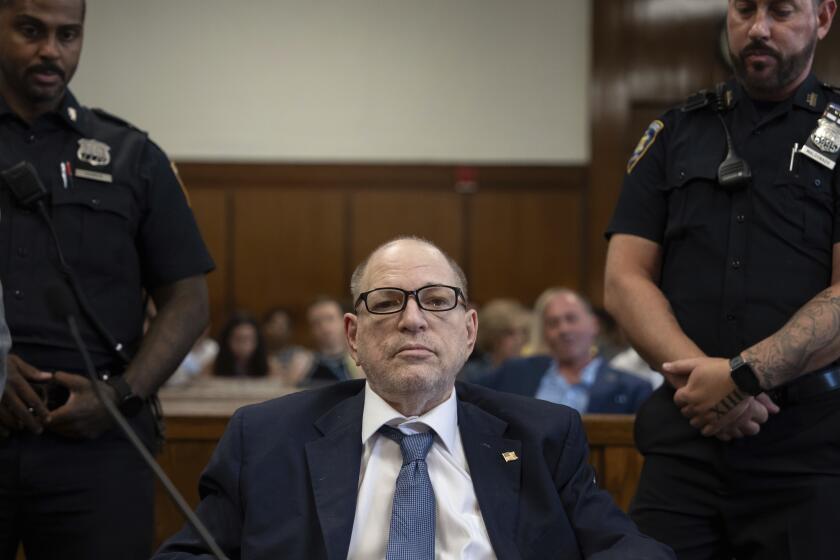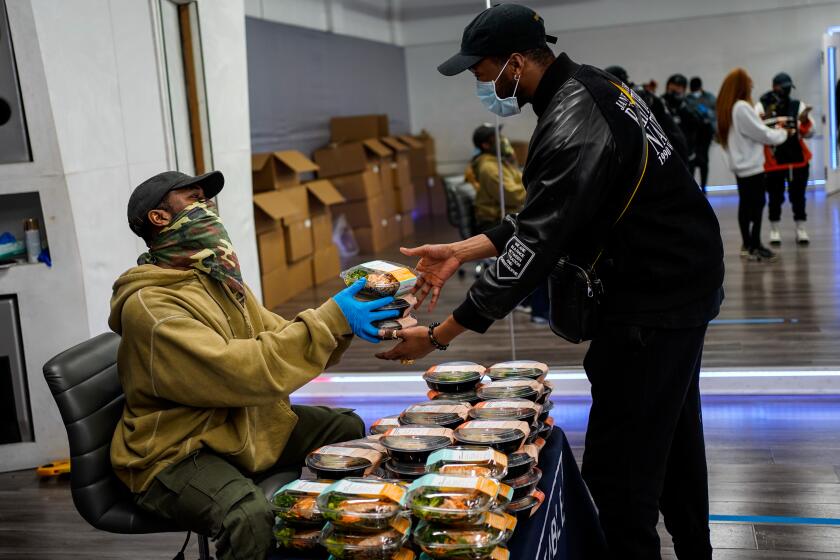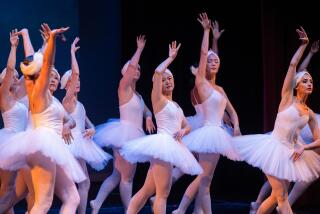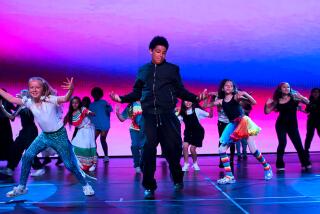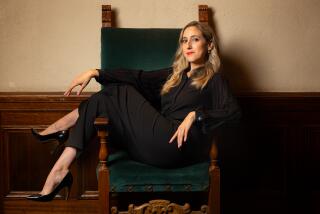Coronavirus pushes L.A. dance companies toward the inevitable: Going virtual
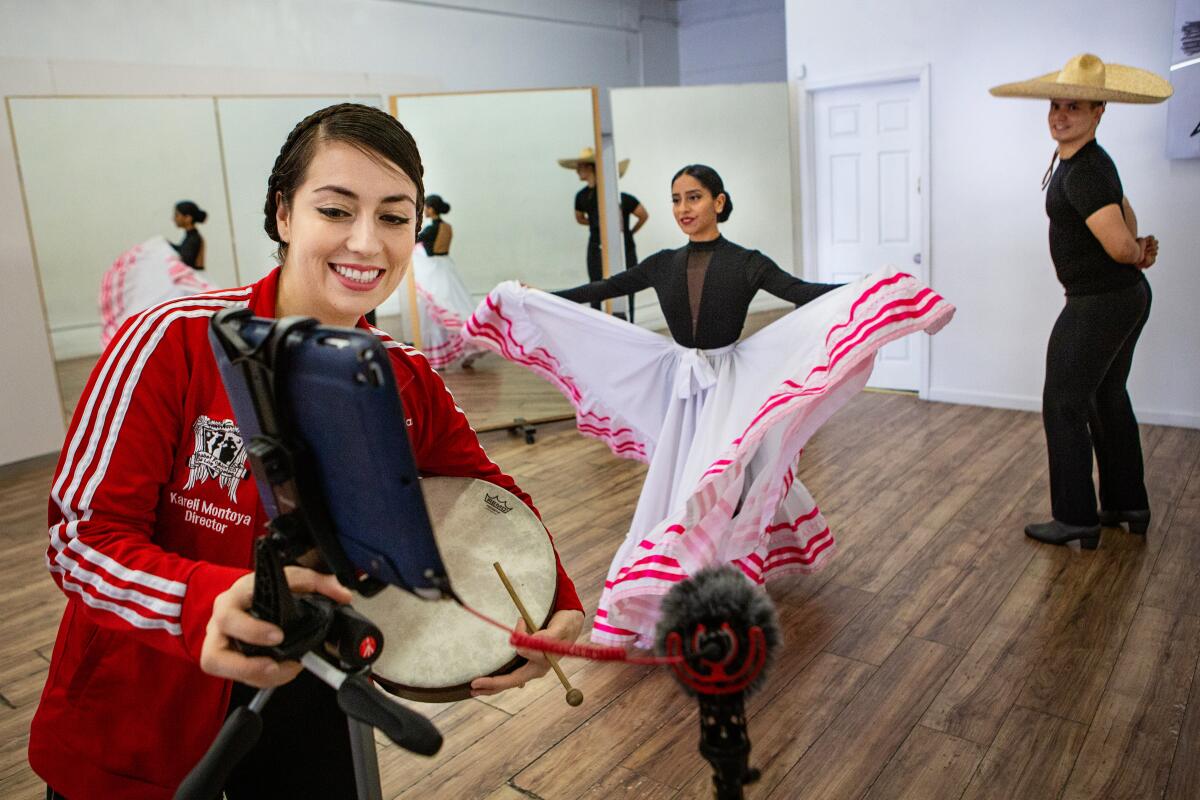
For 35 years, choreographer Heidi Duckler has navigated the unique challenges of creating work in nontraditional L.A. spaces including churches, underpasses and laundromats.
After the COVID-19 pandemic hit, Duckler was in Zoom meetings discussing ways to keep staff, company artists and the community engaged. She thought about the possibilities for her postponed work, “Illuminating the Chandelier,” based on the inner dialogue of a woman in isolation.
Although the work originally was set to open at the Wallis Annenberg Center for the Performing Arts in April, Duckler realized the video conferencing platform itself could be a stage.
So she began the intense process of translating the work to Zoom, working for weeks to gain a deeper understanding of the technology.
The shortened Zoom production that premiered last week mixed prerecorded dance sequences featuring bedroom backdrops, layered with live music and enhanced with costume, set and video design. The performance, Heidi Duckler Dance’s first virtual show, was free but did give viewers the opportunity to contribute.
The performance was a success: An estimated 400 people tuned in, not only from Southern California but also the East Coast and as far away as Brazil.
Going virtual has become the crucial new strategy for L.A. dance companies as they fight for survival in the face of a calendar of canceled rehearsals and shows, lost income from studio space rentals and rejected applications to the federal small-business loan program.
Although Gov. Gavin Newsom recently announced a four-stage plan to slowly reopen parts of the California economy, dance companies and other arts organizations do not yet have clarity on when they can resume regular activities.
In the meantime, dance companies — from ballet to contemporary to hip-hop — are figuring out new ways to sustain themselves through community fundraising and digital projects including online classes, dance films and performances. Offering programming online is a way for the companies to make money, continue building an audience or expand on a social mission.
Running a dance company has always relied on “people coming in through the space and having a communal experience and fundraising,” said L.A. Dance Project Artistic Director Benjamin Millepied. “Those two things, as far as it seems, are over for a while.”
L.A. Dance Project is the rare company that pays its dancers afull-time salary. Dancers recently took a temporary 15% pay cut as Millepied reapplies for the federal small-business loan program after being rejected in the first round.
The choreographer is also working to launch a subscription-based platform offering online classes, interviews with artists and courses in dance history.
“With all the dancers that are going to be home, that are going to be unemployed, this is the time to gather an incredible group of people and give all the knowledge some of these people have to pass on that’s beyond just giving a workout,” he said.

Transforming the dance model is urgent. Until a vaccine is developed, the dance world will continue to struggle, Millepied added.
“We’re seeing all this free content, which is fantastic. But come two months from now and every dancer in the country is unemployed. What happens?”
Some companies were ahead of the curve, already prepared to go virtual before the coronavirus outbreak.
Kareli Montoya, founder of Ballet Folklórico de Los Ángeles, spent years posting dance tutorials to social media and last July launched anonline version of her dance academy based in Montebello, offering classes in folkloric dance, mariachi music and fitness.
Before the pandemic, the online academy, which costs $19 per month, had about 125 students. Now Montoya teaches 250 online, including those from her Montebello studio and from Oklahoma, North Carolina, Mexico, Germany and beyond.
“We were able to pay for rent, but barely,” Montoya said of April, adding that enrollment in the online school helps keep the company afloat.
With more than 133,000 followers on Instagram, Jacob Jonas, 28, prioritized building a strong digital presence ever since creating his company in 2014.
In March the company launched a social media project, #ADigitalDance, to engage the global dance community through weekly movement prompts provided by choreographers including Jonas, New York City Ballet principal dancer Tiler Peck and Kyle Abraham.
So far, more than 500 people from 20-plus countries have participated. Although the project doesn’t generate income, it helps the company stay visible online and “create this sense of community and support other dance companies choreographers, makers,” Jonas said.
But other companies have needed to move fast to offer programming online.
Invertigo Dance Theatre Artistic Director Laura Karlin returned from maternity leave on the day the company went remote. “As I sat down in this empty office, I couldn’t really focus on the crisis or the cash flow,” she said. “It felt so strange.”
Karlin began thinking about how the company and its artists could continue serving the community and continue its mission of making dance accessible for underserved communities.
Within a week, Invertigo moved its Dancing Through Parkinson’s class — which had been offered in studios throughout Southern California for nine years — online. The free class follows the progression of a professional class and can be adapted for people using a wheelchair or a walker and those standing.
Our Dancing Through Parkinson’s classes are designed for people with Parkinson’s Disease but open to everyone and equally beneficial for combating aging or other neurological challenges. To support the classes and keep us all connected, https://sforce.co/2VhgHJZ Today’s Class: Warm up: Rachel Whiting Brain Teaser: Heidi Buehler Seated Choreography: Haylee Nichele Standing Barre: Kelsey Ang Standing Improvisation: Haylee Nichele Have fun, stay connected, be well. With love, Your family at Invertigo Dance Theatre and Dancing Through Parkinson’s Learn more about Invertigo at www.invertigodance.org
“There is no going back to normal,” Karlin said. “So how do we as artists help the world to reimagine a normal that is more compassionate … more considered and thoughtful?”
The situation for dance companies is “brutal,” said Contra-Tiempo artistic director Ana Maria Alvarez. “Pretty much 100% of our earned income is just gone for the next, basically, six months.”
The choreographer recently changed the structure of an in-person, grant-funded program for single mothers, foster grandmothers and other caregivers in South L.A.
In the online dance class version, “we’re welcoming anybody who has kids or anyone in a working family or caretaker,” Alvarez said.
JaQuel Knight, Beyoncé’s head choreographer, organized a meal giveaway. But with concerts, tours and video shoots canceled, help and hope remain scarce.
Over its 40-year history, Lula Washington Dance Theatre persevered through the 1992 L.A. riots, the loss of its West Adams studio in the 1994 Northridge earthquake and the general ups and downs that are a constant for arts organizations in L.A.
“We started with nothing when we started the dance company, and we’ve grown and developed and overcome so many challenges,” Artistic Director Lula Washington said. “This will be something that will come to pass, and we will overcome this as well.”
In recent weeks, the choreographer began working in her South L.A. studio with three other dancers to record a series of instructional videos to help students stay active and positive.
“We’re a little late coming to that platform, because we didn’t really figure that it was going to be this long,” she said. “We have to rethink how we’re going to function, how the dance company is going to move forward.”
At 70 and 69, Washington and her husband, Erwin, who is the company’s executive director, are at risk for severe illness if they were to contract COVID-19.
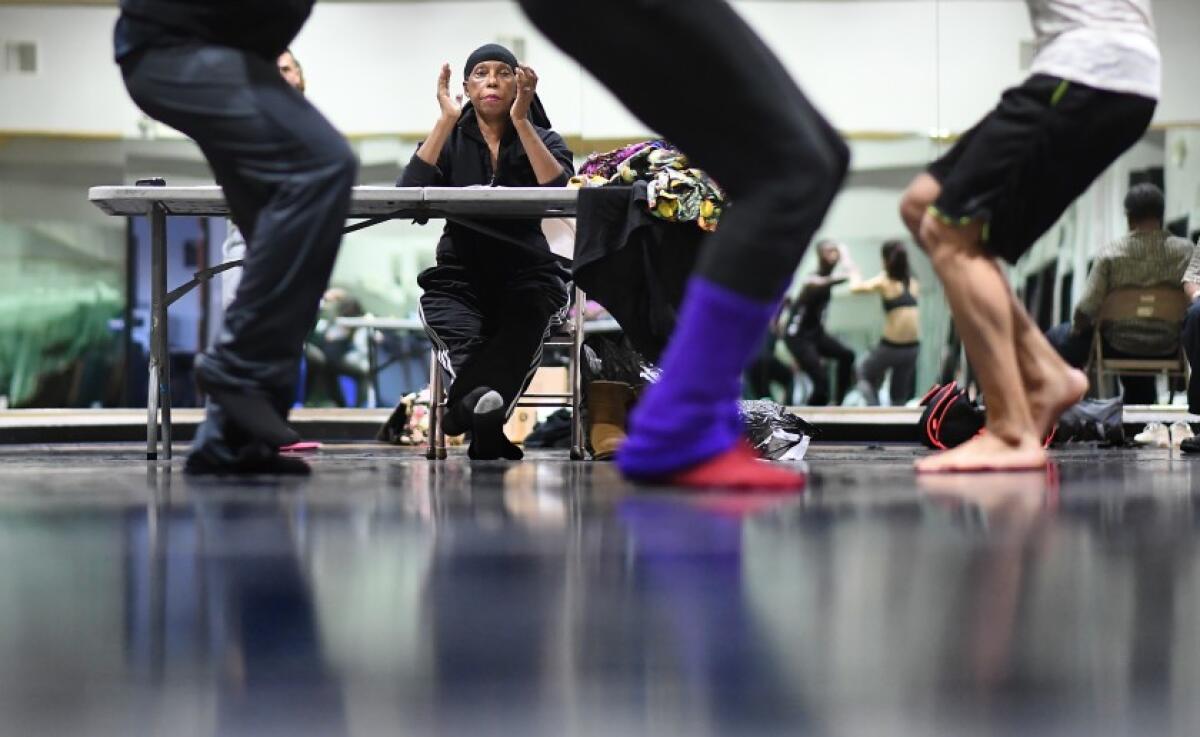
In addition to thinking of new ways to engage an audience online, the couple has sped up conversations about how to transition leadership to their daughter Tamica Washington-Miller, who is the associate director.
“We always knew that she was going to be in this position, but you’re gradually moving somebody into a position,” Washington said. “Now you realize that they could be in this position by Friday.”
More to Read
The biggest entertainment stories
Get our big stories about Hollywood, film, television, music, arts, culture and more right in your inbox as soon as they publish.
You may occasionally receive promotional content from the Los Angeles Times.
